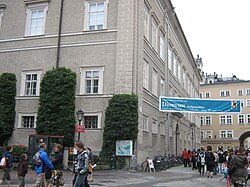History
Dionysos is Rihm's eleventh work for the stage. He considered an opera around Dionysos for 15 years [1] and realized it when he received a commission from the Salzburg Festival, the Staatsoper Unter den Linden Berlin and De Nederlandse Opera. Rihm wrote the libretto, based on Nietzsche's late work, which he fragmented and arranged in a different order. He chose the passages according to his plans for the music. [2] Rihm said in an interview that opera needed more Magic Flute , "mehr Machwerk" (More action), citing the opening scene with three ladies coming to the rescue of the prince attacked by a snake. Rihm said that opera finds its potential in situations that are not ordinary ("... findet ihre Möglichkeiten in Situationen, die nicht alltäglich sind"). [2] The opera has autobiographical traits and is in a way his first comic opera. [2]
Rihm dedicated the work "in friendship" to the conductor Ingo Metzmacher. [3] Rihm composed mostly between December 2009 and May 2010, sending it in batches to the conductor. [1] He finished the finale last minute. [2]
The opera premiered at the Haus für Mozart in Salzburg on 27 July 2010. Johannes Martin Kränzle performed the title role (N.), with Mojca Erdmann, Elin Rombo and Matthias Klink [ de ] in leading roles, the Deutsches Symphonie-Orchester Berlin and the Vienna State Opera Chorus [ de ], conducted by Metzmacher and staged by Pierre Audi. [4] [5] [6] The magazine Opernwelt chose the performance as the premiere of the year (Uraufführung des Jahres), and Kränzle as singer of the year. [2] [7] A live recording was published as DVD.
The production was repeated from 8 June 2011 in Amsterdam and from 8 July 2012 in Berlin. A new production was staged on 8 February 2013 at the Theater Heidelberg by Ingo Kerkhof [ de ]. [8]
This page is based on this
Wikipedia article Text is available under the
CC BY-SA 4.0 license; additional terms may apply.
Images, videos and audio are available under their respective licenses.
